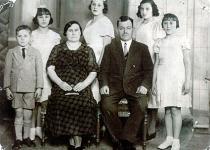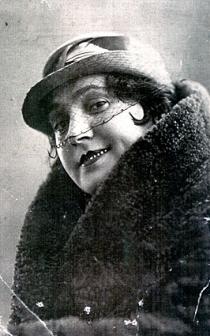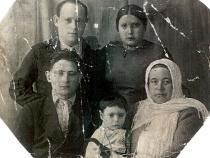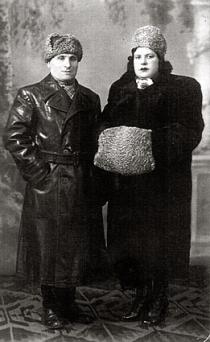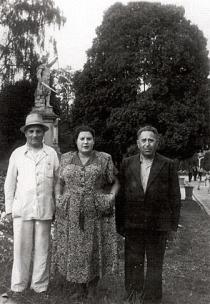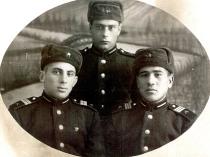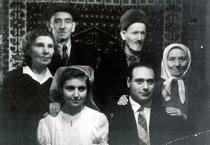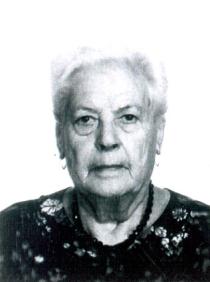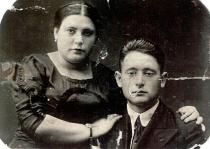
Sarah Kaplan
Lvov
Ukraine
Interviewer: Zhanna Litinskaya
Date of interview: December 2002
Sarah Kaplan is 86 years old. She lives in an old house in the central part of Lvov. She owned a barbershop that used to be in the biggest room of her house. Sarah can hardly walk now; she has problems with her legs. Her friend often comes to stay with her. Sarah has a clear mind. She may not remember some dates or names, but she is smart and has a good sense of humor. At first it was difficult for Sarah to speak, but the more she talked about her family the more inspired she seemed to get. I enjoyed listening to her.
The Great Terror and the Ukrainian Famine
Family Background
My grandfather and grandmother on my mother’s side, Joseph and Khaika Kivnik, were born in Berdichev in the 1870s. More than 90 per cent of the population of Berdichev was Jewish. The rest of the inhabitants were Ukrainians. They lived in the outskirts of town, where land wasn’t so expensive and where they could have enough space for gardens and orchards. People spoke Yiddish and Ukrainian in the town. There were several synagogues, cheders and Jewish schools in town. Jews were craftsmen for the most part. They bought products from the local farmers. There was a shochet at the market where Jews bought their poultry.
My mother’s family was moderately religious. They celebrated holidays, observed traditions and followed the kashrut. They dressed up to go to the synagogue on Saturdays, and on weekdays they prayed at home. On Yom Kippur they fasted, including children over 5 years of age. They spoke Yiddish at home and Ukrainian with an accent to their Ukrainian customers.
My grandfather was a bricklayer. He constructed houses. He built a big three-storied house for his family. His children and grandchildren lived in this house. They didn’t have a kitchen garden or a garden – they bought all their products at the market. They had many children: my mother had ten sisters and three brothers. My grandmother was a vivid lively woman. The family wasn’t wealthy, so she always tried to find work to contribute to the family budget. She always wore a shawl. She used to buy milk from a wholesaler and sold it at a retail price to her neighbors. The man who delivered milk to the town was my future father, Nahman Grinberg.
I don’t remember the names of all of my mother’s sisters, their husbands and children. My mother’s brothers studied at cheder, and the sisters studied with a teacher at home. Later all of them finished the Jewish elementary school in town. The sisters got married, were housewives and raised their children. They lived in the house that my grandfather had built, and there was enough space for them and their families there. Every family had sort of an apartment in this big house, which had as many rooms as the children my grandparents had. From the 1920-1930s 30 to 45 people lived in the house: my mother’s parents, the 13 families of my mother’s siblings and more than 15 grandchildren.
Of all my mother’s siblings only Shepsesh, the youngest brother, received a higher education. He was born around 1910. He graduated from the Construction Institute. He worked as a foreman for some time, then he became chief engineer of a construction site. In the middle of the 1930s he became chairman of the Construction Trade Union of Berdichev. Like any other manager he had friends and enemies. Some people weren’t happy with the distribution of bonuses, others couldn’t get a free ticket to a recreation center. In 1937 some people took advantage of the situation to get rid of Shepsesh [during the Great Terror] 1. During the refurbishment in his office Shepsesh took the portrait of Stalin off the wall and swept the dust off it with a sweep. His fellow employees reported on him to the authorities and the following night he was arrested on the charge of anti-Soviet activities. He was sent into exile in Nogaisk bay in the Far North.
We had no information about him for a long time. Somehow somebody notified him that his wife Polia and their two children, Rachel and Samuel, perished in 1941. They were shot by fascists along with other Jews of the town. Shepsesh met a Russian woman called Nina from Saratov on the Gulag 2. They were released in 1947 and Shepsesh went to Saratov with her. Later he described the horrors of his life in the camp in his letters. There were no trains going to the place and all food products were dropped from planes. They mainly ate fish and fish oil, dried bread and frozen potatoes. He had forgotten the taste of milk and meat. However, Shepsesh recovered from tuberculosis in the camp. He wasn’t allowed to leave Saratov, and we never saw him again. He died in Saratov in the middle of the 1960s.
My mother’s oldest brother, Simkhe, was born in 1893. He was single. He was recruited to the army during World War I and perished on the front in 1914.
My mother’s other brother, Benia, was a bricklayer and worked with my grandfather. After Shepsesh was arrested Benia, his wife Rukhl and their two children moved to Birobidzhan 3 in 1938. His departure to Birobidzhan saved his life and his family. After the war we lost track of him.
My mother was the oldest of the sisters. I only remember the three of them that came after her. Elka, born after my mother in 1896, married a shoemaker called Avrum Burshtein. She died of tuberculosis in the early 1930s. Avrum and Elka had two children: Fania and Srulik, who perished in 1941.
Pesia, the next sister, was married to a tinsmith called Weitzman, and the next one, Perl was married to a locksmith called Shaya. I vaguely remember Esphir, Fania and Tsylia. I have a photo of Tsylia and her children.
My mother, Esther Grinberg [nee Kivnik], was born in 1895. After finishing the Jewish elementary school she helped my grandmother Khaika about the house. My grandfather, grandmother, father, mother and my mother’s sisters were all shot by the fascists in Berdichev fortress in 1941 along with the rest of the Jewish population of Berdichev.
My father’s parents, Leib and Khana Grinberg, were born in the middle of the 19th century and came from Berdichev. They lived in the outskirts of Berdichev. Leib owned a milk farm. He didn’t hire any employees; his family was helping him on the farm. He had five daughters called Rosa, Dina, Sheindlia, Polia and Riva. His daughters were married and their husbands worked for my grandfather. They shepherded cows and made sour cream and butter that they sold at the market. My grandparents’ family was wealthy.
My father also had brothers. They studied after finishing cheder. They were very religious people. The oldest brother, Avrum, was born in 1880 and perished during a pogrom 4 in 1917. His wife and children lived in Berdichev. They were shot by the fascists in Berdichev in 1941. My grandparents’ other son, Haim, was a barber and had his own barber’s shop. He was married and had children. They were all shot in Berdichev in 1941. The younger son, Leivi, was born in 1887 and learned how to handle leather. He owned a shop before the Revolution of 1917. After the Revolution the Soviet authorities built a leather factory on the basis of Leivi’s shop. Leivi continued to work at the factory after the Revolution. He also had a wife and children that were shot in 1941. I didn’t know the rest of my father’s brothers and sisters, but they were all shot in the Berdichev fortress in 1941.
My grandparents and their children were very religious. They strictly observed all traditions, followed the kashrut and prayed twice a day. Grandfather Leib and Aunt Khana died in the late 1920s.
My father was born in 1889. After finishing cheder he worked with his father. Every Friday he delivered dairy products to Berdichev. He stopped near the gate of my mother’s house because my grandmother bought milk from him. My mother liked Nahman and always waited for him on the porch of the house. He gave her a ride on his cart and bought her sweets before he took her back home. This went on for several years until he was recruited to the army in 1908.
Before leaving he asked my grandfather to have his daughter wait until he came back, so that he could marry her. My grandfather was against it because my mother was the oldest daughter and according to Jewish custom younger daughters couldn’t get married until the older one was married. They would have remained spinsters if my grandfather had given Nahman his consent. Besides my grandfather said that it was difficult for him to provide for my mother for so many years. He wanted her to get married and have her husband’s support. My future father didn’t feel like giving up. He talked with a rabbi and made a vow to marry my mother when he came back. The rabbi issued a permit for the other daughters to get married in the meantime. Before his departure my father put a significant amount of money in my grandfather’s bank account.
My father served in the tsarist army in the town of Chuguyev near Poltava for seven years. He was a cavalryman. He went to the front at the beginning of World War I. He was slightly wounded and dismissed. He returned home at the beginning of 1915. My mother waited for him for seven years. My grandfather Joseph didn’t use the money that my father had put in the bank, so my mother opened a ‘kusher milkh’ [kosher milk] store with the money instead. Her business was successful. When my father returned from the army there was three times more money than when he had left.
My father and my mother’s families were religious and my parents had a traditional Jewish wedding. They had a chuppah and broke the glass from which they drank wine under the chuppah. It was a big wedding and there were many guests at the party. After their wedding my father continued to work on my grandfather Leib’s farm, and my mother worked in the store. They lived in my mother’s parents house where my grandfather gave them a room on the 3rd floor.
Growing Up
I was born on 11th May 1916, and my mother quit working at the store. One of her sisters took over the management of the store. My brother, Avrum, was born in 1917 and my sister, Rosa, followed a year later. The first memory of my childhood was of my father gluing ‘kerenki’ on the walls of a shed. [Editors note: Kerenki were banknotes, introduced by the Provisional Government headed by Kerensky 5 in 1917. Its money stopped circulating due to inflation.] The banknotes were printed on big sheets of paper, and my father used them as wallpaper.
Grandfather Joseph and Grandmother Khaika were deeply religious. They observed all Jewish traditions. Since we lived in their house, we obeyed the rules and traditions. Friday was a difficult day for us, girls. We had to clean the house, wash the floors and polish the furniture before Sabbath. My mother, her sisters and her brothers’ wives cooked dinner for Friday evenings and Saturdays. There were twelve families in the house. They all helped and supported one another. There were several kitchens and stoves in the house and there was enough space for all families. My mother made stew, chicken broth, boiled chicken and pastries, put it in the oven and closed its lid covering it with clay. On top of the stove she put bowls of boiled milk wrapped in heavy coats. By the next morning this milk had turned pink. It was delicious.
When the cleaning and cooking was over we all changed into clean clothes. My mother ceremoniously gave my father starched underwear. My father and the other men went to the synagogue. After they returned the family sat down for dinner. My mother said a prayer covering her eyes with her palms and lit candles. My father dipped a piece of challah into salt and poured some wine for himself and my mother. It was a joyful ceremony.
On Saturdays the whole family went to the synagogue. The youngest children were playing in the yard under the supervision of a guard from the synagogue. I remember two synagogues in Berdichev: one for wealthier Jews and the other one for less fortunate people. Our family attended the latter. The synagogue looked like a palace to me with beautifully carved handrails on the staircase leading to the 2nd floor, where my mother and I went, and a chandelier with clinking pieces of glass. I liked it. When we returned from the synagogue our Ukrainian neighbor Antonina came to the house to take the food out of the oven. Antonina also milked the cow while my mother and other members of the family rested.
On big Jewish holidays all families got together at my grandfather’s big table. My favorite holiday was Pesach. Sometime before the holiday the adults made matzah and we [children] rolled special patterns over the freshly baked sheets of matzah. Before the holiday all children were busy searching for breadcrumbs in the house, and the adults were engaged in cleaning activities.
At the first seder the whole family sat at the table. My grandfather reclined on a pillow at the head of the table wearing a white cloak. There was matzah and traditional dishes on the table: a chicken leg, stuffed fish, bean, eggs, etc. There was plenty of delicious food: gefilte fish, chicken, stew and chicken broth with dumplings made from matzah flour. My grandfather conducted the seder. I posed the questions [the mah nishtanah] to him because I was his oldest granddaughter. [Editors note: Usually this question has to be asked by the youngest child in the family.] Actually, it is the duty of a boy, but I was my grandfather’s favorite, and he allowed me to perform this ritual. I asked him, ‘Why do we eat both matzah and bread during a year, but can only have matzah on Pesach’. He explained why and told us the history of Pesach. The family also got together for the second seder and on the following days each family celebrated separately.
On Yom Kippur and before Rosh Hashanah the whole family fasted, even children over 5 years of age. Adults, boys over 13 and girls over 12 years of age went to the cemetery to recite the Kaddish and commemorate the deceased. Before Rosh Hashanah all children got new clothes, we dressed up and went to the synagogue. Then we ate apples with honey and wished our neighbors a nice and sweet year to come. On Chanukkah the children got presents and some change. We ran to the store to buy sweets.
When my brother turned 5 he got a private teacher. It was a rabbi who came to teach him Yiddish, prayers and everything else that boys are taught in cheder. Girls didn’t receive any education as a rule, but my parents made an exception for me. I always sat beside my brother at the desk when the teacher came. He was an old man and used to doze off at the desk, and then I turned the pages of his books over.
When I turned 7 I went to the Jewish lower secondary school. There was a Russian, Ukrainian and Jewish school in the town. The curriculum was the same but the children studied in different languages. The best teachers were at the Jewish school. There were even Ukrainian children in our school. Ukrainians and Jews got along well, there were no conflicts between them. Jews always brought matzah to the families of their Ukrainian friends [on Pesach], and on Easter Ukrainian friends brought sweet Easter bread to their Jewish neighbors. There was a beautiful Christian cathedral in Berdichev. I often went there with my Ukrainian friends. We were so close with them that Ukrainian children fasted with us on Yom Kippur, and we kept them company during the Midnight Mess.
The Great Terror and the Ukrainian Famine
In the late 1920s, when the NEP 6 was over, my father, who was a wealthy man for the time, was declared a ‘deprived’ man. [Editor’s Note: an individual deprived of social rights, in particular, of his right to vote and declared an unreliable and untrustworthy citizen.] Therefore, although I became a pioneer, I wasn’t involved in any public activities. I didn’t care much about it. I enjoyed studying and making friends.
In 1930 during the ‘gold fever’, as it was called by people, the Soviet representatives came to our house. [Editor’s note: ‘gold fever’ was a common term for the forced extraction of gold and valuables by state authorities during the Great Terror.] My father had some gold that he hid in the garden. He didn’t want to give it to the authorities because he had earned it by working hard. They knew my father was a strong man and wasn’t going to give away what he had. So they arrested my mother knowing that my father would do anything for his beloved wife.
My father went to the chief of the security department, Belozyorov, to request him to release his wife and arrest him instead. They arrested him, but they didn’t release my mother. We, three children, were left behind alone. Grandfather Joseph was impoverished by that time, so there was little he could do for us. We had a cart and a horse, and it occurred to me that we could earn our living by delivering wood to people. After a short while a log fell on my brother’s leg and broke it. My parents were released within a few days after my father promised the authorities to give them his gold. He only gave them a part of what he had, but they left us alone for the time being.
My mother told us about the horrors of jail. Her cell was stuffed with so many inmates that there was no space to sit, let alone lie down. The inmates got very little food. The prison administration did everything to create unbearable conditions for the inmates to force them to part with their valuables. Both rich and poor people were imprisoned. If they had gold, they were released, and if they didn’t they were sent to Siberia or died in jail. The wardens in jail were our neighbors and other people we knew. They were poor before because they were lazy, but during the Soviet power they enthusiastically gained official posts and took advantage to torment their more successful friends and neighbors.
In 1932 a famine [famine in Ukraine] 8 began. We were starving like all other people. There was no opportunity to get bread or flour. We were given a miserable meal at school. My father provided us with whatever he could get. My stomach began to swell up from hunger. Shunia, the son of my mother’s friend, Frida Gershman, arrived from Moscow at that time. Frida, her husband and her children, Shunia and Ania, had moved to Davydkovo near Moscow several years before. They rented a small apartment and commuted to work in Moscow by train. Shunia was a barber in Moscow. He came to visit his aunt in Berdichev. When he visited us and saw that we were starved he said to my mother, ‘Let Sonia come with me, otherwise she’ll starve to death here’. [Editor’s note: Sarah was called Sonia at home.] My mother refused to let me go.
Shunia stayed in Berdichev for a whole month trying to convince my mother. My mother was against me leaving with the young man. Before his departure from Berdichev, Shunia came to talk to my mother again. My mother said: ‘You want to take her with you – marry her!’ He agreed. This happened on a Friday. I came home from school. I was a thin young girl of 16, had plated hair and wore a dark blue skirt, a white blouse and my pioneer necktie. My mother was making some pies. I asked her, ‘Is it a holiday? And where did you get flour?’ She replied, ‘You’re getting married today’. I didn’t want to get married. Shunia seemed too old to me. He was only 5 years older, but when one is young it’s a sufficient difference in age. I didn’t dare to disobey my mother – it just wasn’t the way I was raised.
We had a small wedding party. There was a rabbi and a chuppah in our yard. We made seven rounds around it. The rabbi issued a marriage contract, and all relatives congratulated me. We didn’t have a civil ceremony because my mother didn’t want to. What mattered to her was a ceremony with a rabbi. My husband stayed at his aunt’s house overnight.
The next day we left for Moscow. I was crying, reluctant to leave my hometown. I had my mother’s down shawl. I wrapped myself in it and it made me feel better. When Shunia told his mother that I was his wife she was deeply hurt. How could he enter a marriage without her blessing, she asked herself. But in a short while she understood that he actually saved her friend’s daughter from starving to death. Frida prepared a bath for me, combed my hair and made beds for us in different rooms. During the whole time that I stayed in her house she didn’t allow my husband to share a bed with me. He was very kind to me and didn’t even try to enter my room. Every day Shunia commuted to his work in a barber’s shop in Gorky Street. I was homesick, especially when I was at home alone. I didn’t show my sorrow to Shunia and his mother, but at night I kept crying into the pillow.
After two months Frida’s brother Gedaliy came on a visit from Odessa. He was a jeweler and came to Moscow to buy golden and silver jewelry and coins at the black market. Gedaliy asked me why I looked so sad and found out that I was missing my home. He decided to take me with him on his way back to Odessa. He was planning to take me to Koziatin from where I could get home to Berdichev by myself. Gedali told me to not mention our plan to my mother-in-law. On the day of departure I packed my few belongings wrapping them in my mother’s shawl. My mother-in-law asked me to stay, but I was longing to go home. When we boarded the train I saw Shunia on the platform. The train began to roll, and Shunia was running along the platform waving his hand trying to tell me to get off, but I only waved back, feeling proud and happy.
I got off in Koziatin and from there I took a train to Berdichev. Gedaly had sent a telegram to my mother to inform her that I was on my way home, and she met me at the station. She hugged me and we burst into tears. We sat on a bench at the railway station and she told me what had happened when I was away. My younger sister Rosa starved to death. My mother lost 25 kilos due to her grief and sorrow. She ordered a cab, but I refused to go home in the cab. I wanted to walk the streets of my hometown enjoying its beauty. I fell on my knees to kiss the land of Berdichev. It was late. My mother and I walked along a boulevard. I took off my shoes to feel the warm ground. I sat on benches and cried. We got home in the morning. My relatives were waiting for me at home. They were glad to see me, although they couldn’t understand how I could leave my husband. I explained to them how it all happened and they forgave me.
It didn’t work out so good for me for some time. I couldn’t study because I was the daughter of a ‘deprived’ man. I needed to work to earn my living. I found a vacancy at a printing house. Many young people went to work there because they got a meal, a glass of milk and a bun, in return for the hazardous working conditions. I worked at the manual printing composition shop and liked this process. I had an enquiring mind and enjoyed being the first to know the news. At home, when the family came back from the synagogue, they sat on rugs and chairs in our big yard to share the news. I told them about the latest news: the flight of Chkalov 8 to America, the records of our pilots and many other things. My relatives liked listening to me. However, I didn’t work long at the printing house. I began to lose weight and my mother took me to Balaban, a Jewish doctor. He told me to quit my job because there were hazardous substances in the printing shop: lead, antimony and tin.
I read an announcement on a fence about a private course in accountancy and convinced my father to pay the fee for a year’s course. I liked studying there. The school was at some distance from my home and a young man, Alyosha Temnogradskiy, began to accompany me home. Alyosha was Ukrainian or Polish. His father had died, and his mother was growing flowers for sale. Every night we stood near my house kissing. Our neighbors told my mother about this young man. It was scandalous. My mother yelled, ‘How can you do this being a married woman?’ But I was a virgin, just a young girl. Once Alyosha invited me to his home. His mother gave me a beautiful bouquet of flowers. My mother was very angry again when she heard who had given me the flowers. She wrote to my husband in Moscow. She wrote almost a whole notebook in Yiddish. At the end of the letter my mother was asking Shunia whether he was going to live with me, and if so, he should come, if not he should tear the rabbi’s certificate apart and leave me alone. Shunia arrived after a few days. He quit his job in Moscow to reunite with me.
I became a wife. We lived in a room in my parents’ home. My mother watched that I strictly followed all requirements of a Jewish woman in regards to private life. During menstruation a husband wasn’t allowed to touch his wife. After menstruation a woman had to go to the mikveh. My mother made sure that I went to the mikveh. I was afraid to catch a cold there because the water in the mikveh was very cold. But my mother said that it was God’s direction for a woman to go to the mikveh and that meant that I wasn’t going to catch a cold. And I didn’t. When the mikveh at the synagogue was closed in the late 1930s my mother didn’t allow me to share a bed with my husband. Later religious Jews found huge tubs that belonged to a butcher and one of these tubs served as a mikveh to the women from Berdichev. Men didn’t go to the mikveh, they washed themselves at home.
Shunia got a job at the barbershop. We got along well and my mother liked him a lot. Our son, Izia, was born in 1934. He had brit milah on the 8th day after he was born. It was a tradition in all Jewish families. We invited a rabbi who said a prayer, and a man from the synagogue conducted the ritual. We named my son after my husband’s uncle. I was still a young girl and didn’t feel like a mother. I went to the river with my friends and only when milk began to pour down my breasts, did I remember that it was time to feed my son. My mother looked after Izia, and I went to work.
I was assistant accountant at the construction facility of a power plant. I maintained records for the stone that the workers crushed. Once one of my bosses, Beilis, a Jew, told me to write down smaller quantities for the workers so that he could get the remaining quantities of crushed stone written under his name. I told my father about it, and he told me to quit. My husband and I bought a license to open a private barber and hairdresser shop. Small business was allowed at that time. I learned to shave clients and cut hair. When curls were in fashion I went to Trudler in Kiev. [Editor’s note: Trudler was a popular hairdresser at that time.] He taught me to wave hair with steam. When waving hair with circling irons became fashionable, I went to Trudler for training. I made the best hairdos in Berdichev. Shunia and I earned very well.
In March 1937 our cow had a calf. My father slaughtered it. There was a law forbidding the slaughter of cattle. Our neighbor reported on my father to the NKVD 9. He was arrested again and sentenced to 5 years in a camp for the secret slaughter of cattle. The camp was in the Far East, not far from Japan. The inmates starved and the wardens didn’t have sufficient food either. My father talked with the chief warden of the camp and suggested to buy a cow. The chief warden agreed and my father founded a farm. Later they bought a couple more cows and had sufficient dairy products to feed the people in the camp. As an award for decent behavior my father was released before the end of his term. He returned home in April 1941, two months before the Great Patriotic War 10. My father didn’t like to talk about the camp. All I know is that the conditions there were hard. They lived in barracks and slept on straw. There were about 150 of them in one barrack. He only washed himself twice in three years. They starved and worked on a wood-cutting site.
My brother, Avrum, finished Pedagogical College after lower secondary school. He submitted his documents to the Pedagogical Institute in Zhytomir, but he was not admitted there because he was the son of a ‘deprived’ man. Grandfather Joseph adopted him and Avrum entered the institute. Upon graduation he worked as a teacher of physics and mathematics at a school in Berdichev. At the beginning of the war he was the director of the school. Avrum’s fiancée, Sarah, worked as a teacher in Raigorodok, Vinnitsa region.
My husband didn’t serve in the army due to his poor sight. He was a member of OSOAVIACHIM [association for the support of the army’s air force and chemical defense units]. He often took part in military training, but he never thought it had anything to do with a possible war.
During the War
The war, which began in June 1941, was a surprise to all of us. We knew that there was a war in Europe, but it seemed so far away from our small town. We were always told that our country was the strongest in the world, and it never even occurred to us that somebody might attack us. A few days after the war began Berdichev was bombed. My husband was on the watchtower at that time. My 6-year-old son and I climbed the watchtower shouting to him, ‘The town is being bombed, we have to leave!’. But he thought this was just another training and couldn’t believe that Berdichev was really being bombed. When we got down I saw the car of my husband’s boss Kostyukov, the director of OSOAVIACHIM, and his wife and children. There was another car nearby loaded with carpets, dishes, bags with flour and sugar and boxes with herring. I said to my husband, ‘Look, how well prepared your boss is to run away while you stand on the watchtower’.
We ran home and I tried to convince my mother and father to go with us. I didn’t know a thing about how the German treated Jews, but some inkling told me to escape. My parents refused to go, and I failed to convince them. My mother and father’s sisters and brothers and their families also stayed in Berdichev. I ran to Kostyukov to ask him to take us in their vehicle, but he refused. Then I removed one bag of sugar from that other vehicle, got there and pulled my son and my husband onto it. Kostyukov threatened us with his gun, but I didn’t get off the vehicle. I also managed to pick up my brother and get him on the vehicle.
During the summer vacations that year Avrum worked at a pioneer camp, but he came home overnight. He was very concerned because he had left children behind in the camp. He got off the vehicle near Belaya Tserkov and went back. We moved on. Near Belaya Tserkov a bomb hit the car of Kostyukov and his family. There was only a huge pit left from it – the Kostyukov family died. We drove 500 kilometers under constant bombing. The driver and his wife dropped us near Poltava and moved on with all the belongings of the deceased Kostyukov family.
In Poltava we stayed with Ukrainian people. I shall never forget how kind they were. They gave us food and were very nice to us. We went to the evacuation agency. They sent us to Kazan [1,500 km from Berdichev]. I had relatives there: Avrum and Nina, the children of my father’s sister Riva. We stayed with them for a short while. Nina was a very beautiful and kind woman. She made a bath for our son and gave us a meal. Nina and I corresponded for many years after the war. She died in the middle of the 1950s.
I didn’t want Shunia to go to the front. I even hid him in the attic of the house for some time. But he was recruited, and in September 1941 he left for the front. I got a job at a military unit in Poltava. I shaved soldiers and cut their hair. We got accommodation with a Tatar family. Our landlady, Tamila, had six children and there were three of us – nine hungry human beings. Tamila’s husband, an agricultural engineer, perished at the front. We had no food. There were only two cards for the people who worked. The rest were cards for the children, who were dependants, for 100 grams of bread per day, which wasn’t always available. The children went to kindergarten, but they came back home hungry. We lived in the outskirts of Kazan. There were collective farm fields nearby. Tamila and I went to the field at night when nobody could see us. We found potatoes, carrots and sugar beets. We baked these vegetables to feed the children. Our first winter of the war passed. In the fall of 1942 I received my husband’s death notification. I was grieving and cried a lot, but I knew I had to be strong for the sake of my son.
In 1943 I met a Jewish barber in Kazan. His name was Zeilik Kaplan. He came from Mohilev-Podolsk. He was on business in Kazan when the war began. His wife and daughter perished in the ghetto in Mohilev-Podolsk. Zeilik and I fell in love and began to live together. We stayed with Tamila. I went to work at the barber shop of the military unit and Zeilik worked there, too. In 1943 the situation became easier. The officers shared bread and sugar with us knowing that our children were hungry. My son grew attached to Zeilik; they became friends. Zeilik read books to him in the evening.
From radio programs and newspapers we knew about the brutality of the fascists and about Babi Yar 11, about executed Jews and those that were buried alive. I kept thinking about my relatives in Berdichev. I couldn’t believe they had all perished. I wanted to believe in a miracle. When Kiev was liberated in December 1944 my son and I went home. We came to Moscow to see Shunia’s parents. My mother-in-law whose daughter Ania had starved to death, got very attached to her grandson. She didn’t want to let him go with me. She convinced me to let Izia stay with her because the war was still on and there were Germans in Ukraine. I decided it was alright for my son to stay with her until we settled down because I didn’t know where we would get accommodation or how things would go on.
After the War
I arrived in Kiev. The city was ruined. Zeilik’s relative Mendel met me at the railway station. He put me on the train to Berdichev. I didn’t recognize my town or our house. Our beautiful three-storied house had no windows or doors, and its roof was ruined. Our neighbors told me that my relatives and other Jews of the town were taken to the fortress where they were kept without water and food for a few days. Then they were shot. Grandfather Joseph was in the garden when the family was taken away. When everybody left he put on his tallit and tefillin and sat in our garden swinging back and forth and praying. Our Ukrainian neighbor saw him and reported on him to the Germans. They came to pick him up. My brother Avrum and other schoolteachers were shot a few days after the mass shooting. The Germans tied our doctor, Balaban, a respectable man, who had helped many people in the town, to the tail of a horse and pulled him through the whole town.
I entered the house. A young woman and her baby were there. She was the daughter, and the baby was the grandson of the woman that had reported on my grandfather. The woman lay in her bed like a log. A stray shell that had hit our house had torn off her legs and arms. The Lord punished her. She failed to find happiness in our house.
But what was I to do? I was standing on the debris asking God whether a human being could bear this pain, walk and breathe after what had happen. Stepan, the father of one of my Ukrainian friends, took me to his house where I stayed for several days. I knew it would be too much for me to stay in Berdichev – I couldn’t imagine walking the streets of the place where my mother, father, brother and other relatives had been killed. Stepan advised me to sell the land where our house used to be. To do this I had to restore my right to succession of the property. I went to the town housing department to obtain the necessary certificate. I went to see the chief of this department. It happened to be Alexei Temnogradskiy, a man who used to date me once. He helped me to obtain the necessary papers, and I managed to sell the plot of land and the remains of the house. I gave part of the money to Alexei to thank him for his help. I said goodbye to my hometown and left for Kiev.
After some time Zeilik arrived at his relative Mendel’s place in Kiev. We got married shortly after. We had a civil ceremony and began our life together in Mendel’s one-bedroom apartment. When the war was over Mendel helped us to obtain a license, and we opened a barber-shop at the Evbaz. [Editor’s note: Evbaz is the name of the Jewish bazaar, an old Jewish neighborhood in the center of Kiev.] However, there was too little space in Mendel’s apartment and we had to think about getting a dwelling of our own. At that time people were recruited to work in Western Ukraine and the Baltic Republics that had joined the USSR some time before. We were attracted by the promise to get a job and a place to live and went to Chernovtsy. There was work, but we didn’t get an apartment. In 1950 my husband and I arrived in Lvov where my husband’s uncle lived.
I still had some money left from selling the house. We bought and apartment and paid for the license to open a barber-shop. The shop was in the bigger room of the house. Zeilik was a barber, and I was a hairdresser. We lived in the small room in the back of the house. We had many clients and made a good living. We went to the theater and to resorts in the Crimea and the Caucasus.
My son, Izia, stayed with my first husband’s parents in Moscow. My mother-in-law didn’t forgive me for remarrying. She thought that I had betrayed her son. But I was young and wanted to enjoy life. For her sake I agreed that Izia stayed with her. After finishing school he took a course to become a trolley bus driver. In 1962 he married a Jewish girl called Lena. They had a wedding party at a restaurant; it wasn’t a religious wedding. They received an apartment in Moscow. They have two sons. Izia always identified himself as a Jew, but his family didn’t observe any Jewish traditions. I sent money to support him every month and went to visit him. Izia spent his summer vacations with us.
Post-War Antisemitism
Everything was going fine, but anti-Semitism in Western Ukraine was thriving. Everywhere I could hear ‘zhydovka’ [kike]: in the streets, on public transportation and in stores. I always observed all the Jewish traditions that my mother had taught me. My husband and I spoke Yiddish. We celebrated all Jewish holidays. The synagogue was closed, but we prayed at home every day. We have our prayer books at home. There was no place to buy kosher food, but we never ate pork or dairy and meat products together. Even when it was impossible to officially get matzah there were underground bakeries where we could always get some for Pesach. All Jews knew the addresses of these bakeries and kept them a secret from outsiders. My husband and I always fasted on Yom Kippur and commemorated the deceased. Religious Jews always had religious calendars that their friends brought from Israel. They made copies of these calendars and sold them to Jews. We never acknowledged or celebrated Soviet holidays, but used them as an occasion to meet friends and invite them to our house to have a good time together.
When the emigration to Israel began in the 1970s I was inspired to move there. But then the Yom Kippur War 12 began and we stayed. In 1987, during perestroika, we decided to move to Israel. We received an invitation from Israel in 1991, submitted all necessary documentation and obtained foreign passports, visas and permits. We had our belongings shipped to Israel. Shortly before our departure the doorbell rang. I looked through the eyelet and thought my friend’s son was standing at the door, so I opened it. Three bandits wearing masks stormed into the house. They demanded money, but we didn’t have any left. I gave them my golden jewelry, our wedding rings, golden watch and my earrings. I told them that it was all we had. They brutally beat us.
After they left I asked our neighbors to call the ambulance. Two different ambulances took my husband and me to the hospital. Zeilik died on the way to the hospital, and I had an extensive infarction. When I came back to my senses and heard that my husband had died I wished I had died, too. I didn’t want to take any medication and refused injections. The chief doctor of the hospital saved me. He was a Jew, and when he heard what had happened to us he was committed to save me. He brought medication and food from home. He fed me begging me to live. He brought me back to life.
My husband was buried in the Jewish section of the town cemetery while I was in hospital. He was buried without any rituals. When I returned home I borrowed some money and went back to work. I was 75. There wasn’t much I could do, but I worked from morning to night. I didn’t get our luggage back. I managed to buy some furniture from what I earned.
Now I live alone in this half-empty house. I know who robbed us. Every now and then I see one of those bandits. He passes by as if I weren’t there. I was afraid to go to court because I was scared of the bandits.
My son Izia and his wife live in Moscow Region. He worked as a trolleybus driver. Izia’s two sons live in Moscow. When they were young boys they used to spend their summer vacations with us. My husband loved them dearly. He took them to the sea. After finishing school they stopped seeing us that much, but we still try to see each other at least once a year. They are married. Arkasha graduated from the Technical- Physical Institute; his wife Lena, a Jewish girl, is also a physicist. Yasha graduated from the Trade Institute in Moscow. He worked at a restaurant.
During perestroika Arkasha lost his job. He could play the guitar and accordion. In 1995 he took me to his home in Moscow and I translated Jewish songs in Yiddish for him. I stayed there for three months. Arkasha founded a Jewish band. He works at the kosher restaurant near the Paveletskiy railway station in Moscow. He has two children. Yasha has a daughter. My grandchildren are doing well, but I’m here alone. It would be difficult for me to move to Moscow to join them. I’m at home here.
The Jewish charity organization Hesed provides important assistance to me. I get free meals, medication and Jewish newspapers. Hesed often invites me to the club where I have Jewish friends. Of course, I won’t go to Israel any more now, but the country is very dear to me. I feel as if it were my motherland, and I think Hesed is a part of Israel. This helps me to continue to live my long and difficult life.
Glossary:
